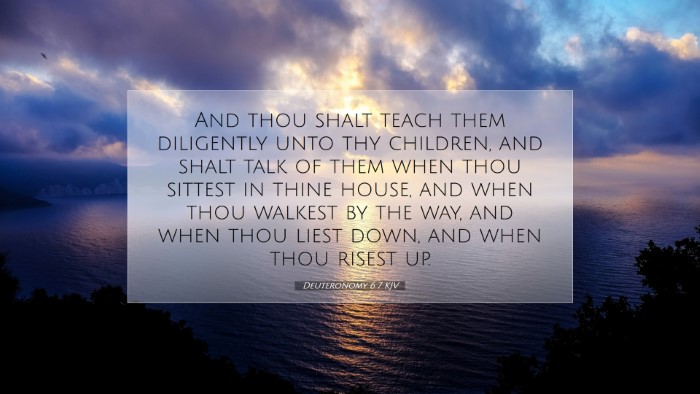Commentary on Deuteronomy 6:7
Bible Verse: "You shall teach them diligently to your children, and shall talk of them when you sit in your house, and when you walk by the way, and when you lie down, and when you rise up." (Deuteronomy 6:7, ESV)
Introduction
This verse is an essential part of the Shema, a foundational declaration of faith in Judaism. It emphasizes the importance of teaching God's commandments and making them an integral part of daily life. Deuteronomy 6:7 serves as a profound reminder for parents, educators, and spiritual leaders regarding their duties toward the next generation.
Exegesis and Context
In its immediate context, Deuteronomy 6 is focused on the importance of loving God and keeping His commandments. The preceding verses detail the oneness of God and the love one must have for Him, which sets the stage for the teaching of God's law to children.
Matthew Henry highlights that this directive to teach is not merely about instruction but about fostering a deep, loving relationship with God that must permeate every aspect of life. He notes that "it is not only a duty, but a privilege to spend time discussing the things of God with our family."
Teaching Diligently
The phrase "teach them diligently" suggests a proactive, persistent approach. Albert Barnes interprets this diligence as involving both intentionality and constancy—education in spiritual matters should not be left to chance or limited to formal settings. Instead, it must be woven into the fabric of life.
Additionally, Adam Clarke elaborates on the Hebrew word used for "diligently," implying a sharpening or whetting of the mind, akin to a craftsman honing a tool. This reflects the urgency and care with which one should impart knowledge about God and His commands.
Methods of Teaching
The verse outlines practical moments for instilling faith: when sitting in the house, walking by the way, lying down, and rising up. Each of these scenarios presents unique opportunities for conversation and reflection on God’s laws.
- In the Home: Matthew Henry points out that the home should be a primary site of spiritual influence. Parents are encouraged to engage in discussions about faith during everyday activities, thus making God a constant presence in the household.
- Walking by the Way: Albert Barnes emphasizes the importance of teaching during travels or walks, illustrating that learning about God's commandments can occur in the course of daily movement and experiences.
- At Bedtime: Adam Clarke discusses the significance of sharing biblical principles as the day concludes, creating a reflective atmosphere conducive for meditation on God’s word.
- Mornings: Starting the day with reminders of faith cultivates a mindset oriented towards God's guidance and priorities as one faces the day ahead.
Implications for Faith Communities
This verse's emphasis on teaching extends beyond the familial unit. It serves as a call to the broader faith community, urging churches and religious organizations to become active participants in spiritual education.
Matthew Henry asserts that spiritual leaders must model and promote an environment where church members collectively engage in teaching and discussing God's word, echoing Deuteronomy 6:7's directive.
Albert Barnes further suggests that faith communities should provide resources and frameworks that enable families to discuss and live out their faith in practical ways, fulfilling the biblical injunction to teach diligently.
Conclusion
Deuteronomy 6:7 serves not only as a mandate for parents but also as a profound reminder to all believers of the importance of instilling faith in daily life. It challenges pastors, educators, and church leaders to pursue a relentless commitment to spiritual education in every facet of community and family life. In nurturing a culture of discussion and reflection on God’s commandments, believers can faithfully pass on their heritage of faith to future generations.


